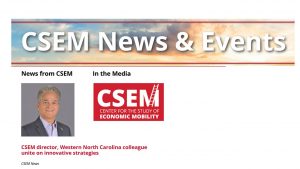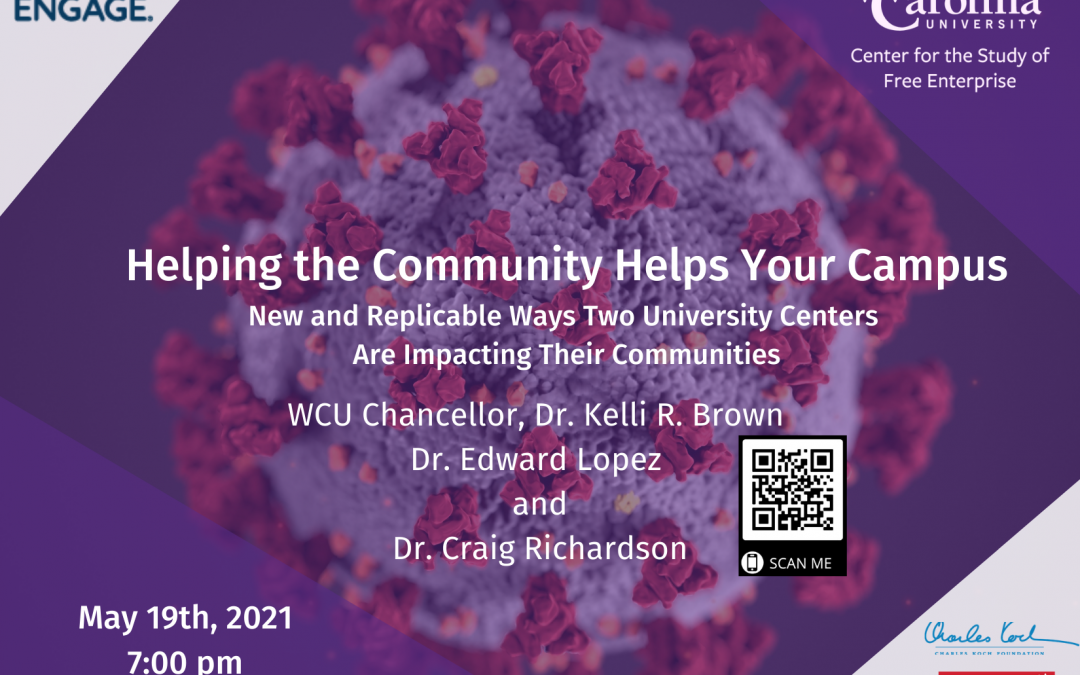
Recap and Video of “Helping the Community Helps Your Campus”
As summer settles in, we invite you to check out the recap (below) and video of our May 19 event, “Helping the Community Helps Your Campus: New and Replicable Ways Two University Centers are Impacting Their Communities.” Craig Richardson and I are co-presenters. We cover the surprising ways geography creates economic and social division, and how our university centers have used research to identify and address problems. We discuss our “recipes” for bridging research and community. And we have a simple three-part takeaway: Equip, Connect, Transform.
Enjoy. And please drop us an email to let us know what you think.
CSEM director, Western North Carolina colleague unite on innovative strategies
By John Railey
CSEM Writer-in-Residence
Craig Richardson and Ed Lopez work in different areas of the state but are confronting similar challenges with innovative techniques. “We’re not in our silos,” CSEM Director Richardson said during a public discussion Wednesday night with Ed Lopez, the director of the Center for the Study of Economic Mobility at Western Carolina University in Cullowhee. “We’re actually going out in the community and seeing real change.”
Western Carolina hosted the event, which was livestreamed nationwide in partnership with the American Council on Education.
Richardson and Lopez both lead in research to help raise economic mobility. Both work in areas with big challenges. Lopez’s area is divided by rugged mountains that inhibit connectivity and economic growth. Winston-Salem is divided by U.S. 52, for generations the barrier between East Winston and prosperous areas to the west. Both men are using multidisciplinary approaches, inspiring student interns and sharing their centers’ groundbreaking research with community partners. Publishing in academic journals is important, Lopez said, but “it can be a transition point. It doesn’t have be the endpoint.”
Richardson and Lopez believe in putting their research to work in their communities. Wednesday night, they talked about their “recipes” for doing that, keeping the focus tight by concentrating on specific parts of their work. Richardson talked about CSEM’s work on transportation: solid research and a documentary, Bus Stop Jobs, which have been a major catalyst in encouraging The Winston-Salem Foundation to enact a grants program aimed at innovation in public transportation.
“You can move minds, but you have also have to move hearts,” Richardson said. “The recipe for impact was empirically grounded research and an emotionally connected film.”
Lopez talked about his center’s recipe for confronting the opioid crisis: a multi-disciplinary effort, using academics and experts from fields including criminal justice and social work. “We had a month-long public-awareness campaign, connecting emotionally on this important issue, telling the stories and allowing the research to connect,” he said. He uses a slogan to describe his center’s work in general: “Equip, connect and transform.”
Richardson and Lopez talk often, exchanging their “recipes.” Their centers are garnering national attention, setting models other colleges might use to confront the challenges beyond their walls.
Source: CSEM News & Events.
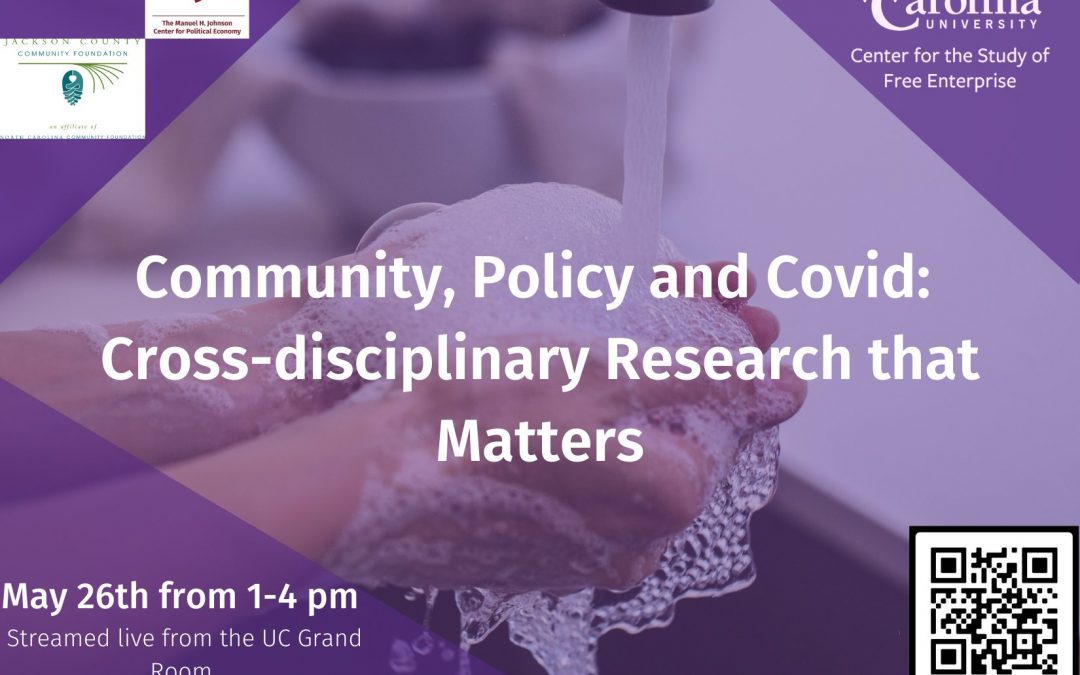
CSFE as Hub and Platform: Cross-Disciplinary Research that Matters
As CSFE nears the end of its fifth year, the Scaled-Up Seminar and our Faculty & Student Affiliates programs have become two key programs. Together, these programs connect over 100 faculty and student researchers from different disciplines and colleges at WCU, and from campuses in the southeast region.
On Wednesday, May 26, these two programs met in the form of our live presentation and webinar, “Community, Policy and Covid: Cross-Disciplinary Research that Matters.” Presentations were offered from multiple perspectives and academic disciplines, and presenters included one WCU graduate student and two external faculty affiliates who came to CSFE through the Scaled-up Seminar.
The full line-up of speakers and topics is on our event page, and you can check out the event video is here. Through these programs, this webinar, and many other efforts, CSFE is serving as a hub and a platform for connecting our network of faculty and student researchers with needs in the community.
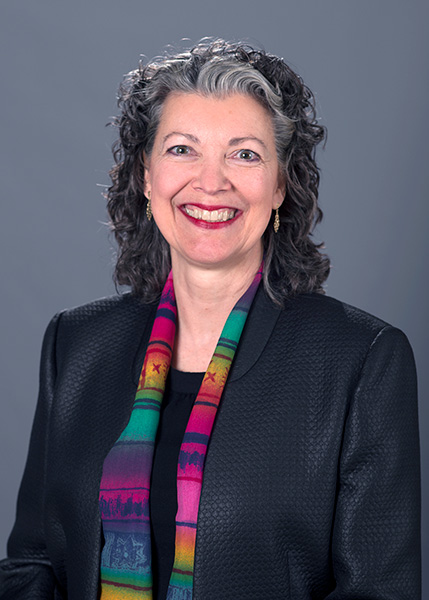
Meet Emma Miller
Last year, we began our spotlight series on our 2020-21 Faculty Affiliates, and continuing with this series, today we would like to highlight Emma Miller.
Emma Miller, MSW, LCSW is an Assistant Professor of Social Work and the U.S. Health Resources and Services Administration’s (HRSA) Behavioral Health Workforce Education and Training Program for Professionals (BWHET) Project Coordinator. Some of Emma’s main research areas are prenatal and infant mental health, health promotion and risk prevention, life transitions, integrated healthcare, interprofessional education, and behavioral health systems alignment and capacity building.
Emma’s research for CSFE was focused on posttraumatic growth in response to the COVID-19 pandemic. Partnering with a social work graduate assistant, Chelsea Sokolow, Emma combined her social work background and passion for cultivating human potential to explore how these could be positive transformations instead of a return to the status quo.
“People desperately want to return to normal after COVID-19. I’m going to underscore ‘return to normal.’ So, I began wondering what ‘normal’ was, if that was possible, and even if it was the most ideal,” said Emma, continuing, “Especially in 2020, we were not only experiencing COVID-19, but we were also experiencing many political and social changes. We were finding that our individual routines were highly disrupted along with our societal structures. This seemed to be profound and traumatic on many levels.”
The shared traumatic event that is the COVID-19 pandemic has changed the way that our lives are operating on a daily basis and it has caused various other aspects of society to shift along with that. Emma’s research considered experiences in Western North Carolina as a way to extrapolate to a helpful perspective for societies on a global scale.
“We are delighted to share that, indeed, there does seem to be a way for us to have positive, transformational changes. We really can surpass our previous individual and group functioning and wellbeing,” said Emma, continuing, “Posttraumatic growth highlights the possibility of having more promising tomorrows. So instead of a return to ‘normal,’ we can go past the status quo, and seek new opportunities that can advance us, individually and collectively.”
We are so excited to continue to work alongside Emma with her research. As the semester winds down, Emma and Chelsea Sokolow will be presenting their research as a part of CSFE’s COVID-19 Impact and Recovery Town Hall series. Stay tuned on our social media channels and here for more information about the series coming soon.
Thank you, Emma Miller, for being a valuable part of the CSFE community.
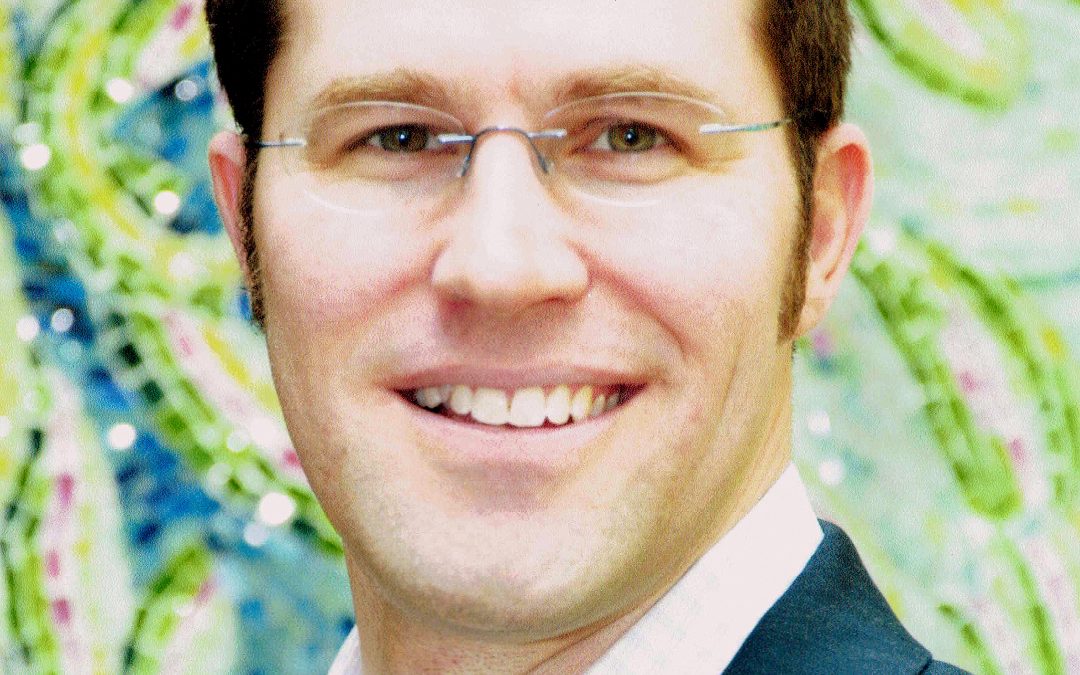
Meet CSFE Associate Director Sean Mulholland
Last year, we began our spotlight series on our 2020-21 Faculty Affiliates. Today, we would like to introduce CSFE Associate Director and WCU Professor of Economics, Sean Mulholland.
Sean was born and raised in South Carolina and earned his M.A. and Ph.D. from Clemson University. Before taking a position at WCU, he held faculty positions at Boston College, Stonehill College, and Mercer University. Sean has investigated a wide variety of topics including, human capital and economic growth, white supremacist groups and hate crimes, school competition and student performance, and Uber and vehicle fatalities.
As Associate Director since 2020, Sean is responsible for putting together the CSFE’s Scaled-Up Seminar. Scaled-Up is CSFE’s event that gathers academics from different institutions to work-shop ongoing research with other professionals. Another responsibility is with our 2020-21 Faculty Affiliate Cohort. Sean brought together faculty from both inside and outside WCU’s economic department that are investigating the effects of the COVID-19 pandemic and how people are seeking to reduce the adverse effects of the pandemic.
In addition to his associate director role, Sean is also heavily involved with research. As a part of the Collaboratory Grant CSFE received in 2020, Sean, along with CSFE Director Edward Lopez and faculty affiliate Steve Ha, researched how COVID-19 impacted our area. Sean focused on how the different executive orders affected the infection and death rates – if at all.
“I used something called a synthetic control method where I said, okay, let’s look at counties in the Western part of North Carolina and create synthetic counties made up of counties in South Carolina, that behave similarly to the N.C. counties before COVID-19. So, for instance, let’s look at Jackson County and create a synthetic Jackson County, composed of a composite of S.C. counties whose unemployment rates behave similarly to Jackson County N.C. before COVID-19. Once constructed, I then compare how the synthetic Jackson County’s unemployment rate behaved under the South Carolina Governor McMaster’s policies and compare that to Jackson County’s unemployment rate under Governor Cooper’s policies.”
Sean used this synthetic control analysis for all 23 counties in Western North Carolina, and what he found was quite interesting.
“The fascinating thing was there wasn’t a big punchline. It was not that all North Carolina counties fared better or worse than the composites I created. However, it does appear that more urban counties in Western North Carolina, like Buncombe county, fared worse, both in terms of the unemployment rate and in terms of COVID death rates, than the synthetic Buncombe counties generated using South Carolina, Georgia, and Tennessee counties.”
The results suggest that N.C. executive orders had little to no effect on unemployment and death rates in rural counties, but, in urban counties, the executive orders increased the unemployment rates and had little to no effect on COVID-19 death rates. These results are essential to consider if we are ever faced with another pandemic.
We are proud of all of Sean’s research and his commitment to CSFE, and we look forward to following along as his research progresses. As Associate Director, Sean also wants to thank the CSFE Board Members for their continued support and invaluable input.
Thank you, Sean Mulholland, for being a valuable part of the CSFE staff and community.
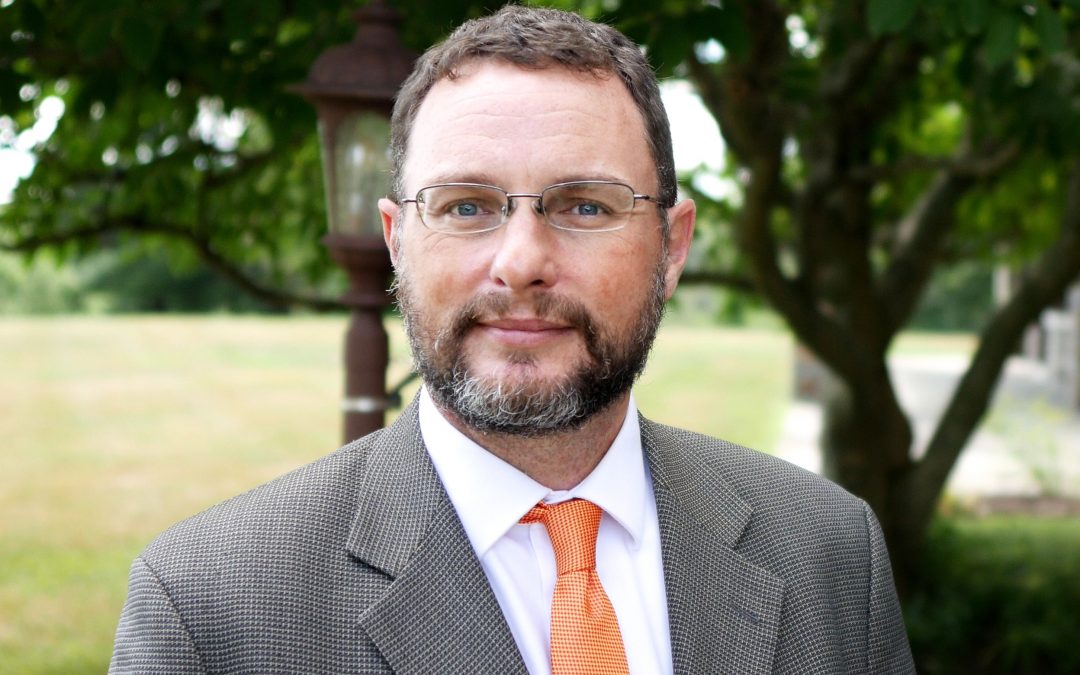
Meet Stephen Miller
Last year, we began our spotlight series on our 2020-21 Faculty Affiliates, and continuing with this series, today we would like to highlight Dr. Stephen Miller.
Stephen is the Adams Bibby Chair of Free Enterprise in the Manuel H. Johnson Center for Political Economy at Troy University. Before joining Troy, Stephen was on the economics faculty at Western for eight years, and he served as director of SACS re-accreditation, before taking his current position at Troy. His current research focuses on the economics of politics and individual beliefs and has been published in several academic journals, including Public Choice, Intelligence, Critical Review, and Public Opinion Quarterly.
In the summer of 2020, Steve teamed up with CSFE Director Edward Lopez and CSFE Advisory Board member Craig Richardson, to publish this CSFE Issue Brief, finding that positive cases did not portend hospitalizations and deaths in the July surge as they did during the April surge. The trio has now turned their focus on how different regions of the US handled the late 2020 surge, which was far greater in magnitude than either of the earlier surges.
There is an ongoing conversation about the causes and consequences of the winter surge and how it differed from what came before. Stephen’s research focuses on measuring the data and then providing feedback on public health measures and implications for public health policy.
“Focusing on public health measures that do not have anything to do with vaccines or treatments, those seem to, at best, be something that can work in a very short-term delay of a wave,” said Stephen, continuing, “What I would say now is that it [non-pharmaceutical intervention] doesn’t seem to be capable of overcoming that very big seasonal pattern.”
Public health measures across the country during the times of peak cases, hospitalizations and deaths were imperative to slowing the spread and getting through the peak, but not all of those were created equal for everyone in the U.S.
“There’s also a very disparate impact in terms in terms of these policies. I have the kind of job where I can do a lot of work over Zoom, but for some people to make money, to do their job at all, that’s not an option. There’s also just a disparate impact in terms of the virus itself,” Stephen said, continuing, “Not everybody can be in a large home. Some people are confined to pretty close quarters. Some people live in areas where the buildings are very old and not very well maintained, so maybe ventilation is poor. There is a lot of deeper inequality than just what we think of in terms of income shares or even intergenerational mobility, whether you earn more than your parents. There’s something deeper there in terms of the access that people have.”
We are so excited to continue to work alongside Stephen with his research and we look forward to following along as his research progresses. As the semester continues, their updated Issue Brief will be published and be presenting this research at the Association of Private Enterprise Application Meeting while Stephen also continues on with his other research on rent-seeking and inequality.
Thank you, Dr. Stephen Miller for being a valuable part of the CSFE community.
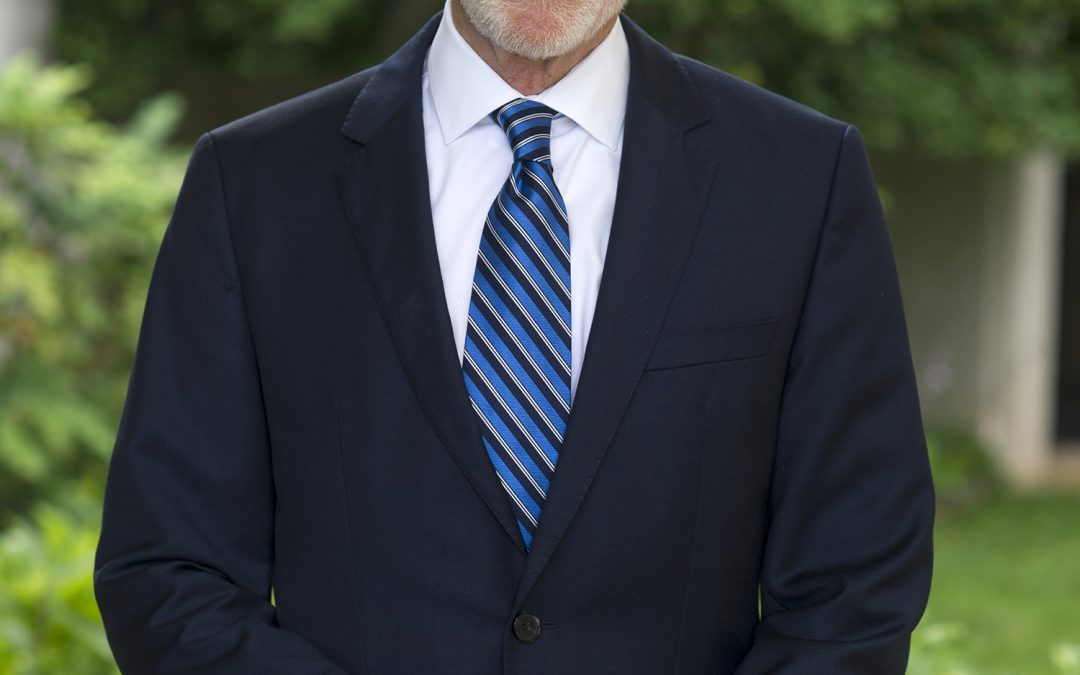
Meet David McCord
In 2020, we began our spotlight series on our 2020-21 Faculty Affiliates, and continuing with this series, we would like to highlight Dr. David McCord.
David is a Professor of Clinical Psychology at WCU, with research interests focused on personality theory and the development of a new-paradigm, multi-dimensional mental health screening test for use in primary medical care settings. Before beginning his career as a professor at WCU, David received a B.A. in Psychology from Duke University, a M.A. in Clinical Psychology from WCU, a Ph.D. in Clinical Psychology from The University of Alabama, and Clinical Internship in the Department of Psychiatry, School of Medicine, UNC-Chapel Hill.
While the goal of the U.S. healthcare system is to have integrated care across physical and mental health, because of time constraints and other factors, there are significant gaps, particularly regarding accurate and efficient screening for mental (behavioral) health concerns. To address this issue, David and his research group are currently working on a multi-dimensional mental health screening test for patients to use while they sit in the waiting room at their primary care provider’s office, or, better, on their smartphone prior to arrival. This 3-minute screener takes no time away from their visit and requires no effort on part of the provider, while thoroughly screening all patients for mental health issues or risks of suicide.
“An essential requirement is that it takes no time on the part of the primary care provider. The data are processed automatically and inserted into the electronic health record and displayed in graphical form. The provider is able to see at a quick glance whether significant behavioral health issues are involved,” said David.
Currently, their screening is 29 questions at about a fourth-grade reading level, so it is quick and easy to understand for patients. The screening measures across 9 facets of mental health and plots each on a graph, for the ease of the provider. While the screener is designed to cover major mental health issues, it includes a focus on emergent issues of suicide risk and indicators of maladaptive substance use. These two issues are significant threats to societal economic well-being and general quality of life.
“While suicide risk and substance abuse risk are certainly recognized as important health factors, current screening methods are clumsy, imprecise, and somewhat haphazardly utilized,” said David, continuing, “We are recruiting nationally recognized experts in both key areas, and at present, we are fine-tuning our prediction formulas to achieve optimal accuracy. We are advocating for population surveillance screening, every patient, every visit, in primary care. Early identification and early intervention can make a major difference in both areas.”
This instrument is not theoretical, David and his team of Graduate students have been working with MAHEC in Asheville to screen post-partum mothers. This provides tangible, real-time data to measure the accuracy and practicality of the screening.
“We’re closing in on this version 2.0, then we’ll have data, some this spring, some this summer, and then a lot next fall,” said David.
We are so excited to continue to work alongside David with his research, and we look forward to following along as his research progresses. In the future, David would like to see this mental health screening test available in all primary care facilitates across the U.S.
Thank you, Dr. David McCord for being a part of the CSFE community.
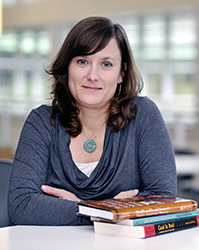
Meet Turner Goins
To continue with our highlights of our 2020-21 Faculty Affiliates, today we are putting Dr. R. Turner Goins in the spotlight. Turner is the Ambassador Jeanette Hyde Distinguished Professor in the Department of Social Work in the College of Health and Human Sciences at WCU.
Turner received her B.A. in Psychology from East Carolina University and her Master’s and Ph.D. in Gerontology from the University of Massachusetts-Boston. Before joining WCU as a professor in 2013, she completed a post-doctoral fellowship at Duke University’s Medical Center and held faculty positions at West Virginia University and Oregon State University. Turner’s research is primarily focused on American Indian and Alaska Native aging-related issues.
CSFE is currently planning our 2020-21 COVID-19 Townhall Event, partnering with organizations beyond WCU, to create a series of virtual and small in-person events on a variety of topics. Turner will be presenting her research, which is a study done in the spring of 2020 with her research class involving interviewing older adults about their experiences with coping with the pandemic in lockdown and adhering to the recommendations.
The study had 43 participants confined to the U.S. and were each asked about their perceived risk of poor outcomes if they were to contract COVID-19, how their finances had been impacted by the pandemic, and the emotional coping of being in isolation. Currently, Turner is working with her research class this semester to conduct a follow-up study with these same participants.
“The emphasis was primarily on how older adults are coping, how are they handling the emotional end of things, because research shows that prior to COVID-19, older adults were at greatest risk for being socially isolated. Social isolation has been shown to have a lot of negative outcomes for people in terms of physical and mental health outcomes,” said Turner, continuing, “Since older adults are at highest risk for social isolation, when you layer on top of that, the pandemic and the expectations to socially isolate, as a gerontologist, I had the interest to see, how was that?”
Through this qualitative study, Turner and her research class found how important it is to frame this in a positive light and to acknowledge the resiliency of not only their participants but all U.S. older adults. “This study reflected the extent that they [participants and older adults] are being resilient with their coping and finding new and creative ways to structure their days as we try to minimize our exposure,” said Turner.
We are very proud to have Turner in our 2020-21 Faculty Affiliate cohort and for her current research. Her research study above is under review at a public health journal, and she hopes it will be published soon. As she will be participating in our COVID-19 Townhall Event later this spring, be sure to check back to our website or Facebook page for updates on that event.
Thanks to Turner for making her work a part of CSFE.

COVID-19 Prevalence and Empty College Seats
A year ago, many prospective 2020 high school graduates were finalizing their decisions on whether and where to attend college. The 2019-2020 application and acceptance process was much the same as it had been over the last twenty years. Most selective schools still required standardized tests. Many students had applied to their reach schools and safety schools. These soon-to-be high school graduates were scheduling admitted student day visits. But a new, novel little virus was about to derail their plans.
Many early articles The Chronicle of Higher Education and Inside Higher Ed began discussed how the COVID-19 pandemic was altering college enrollment (The Chronicle of Higher Education 2020; Hoover 2020; Jaschik 2020a). As the number of cases and deaths increased and institutions became increasingly concerned about how it might impact students’ choices and decisions, many colleges moved the traditional May 1st decision day later into June, July, and even August (Jaschik, S. 2020d; Redden, E. 2020b). Yet little concrete evidence was available.
One of the preliminary sources on college enrollment came from the National Association for College Admission Counseling’s (NACAC) online bulletin board (National Association for College Admission Counseling 2019, 2020). Each year the NACAC asks postsecondary member institutions about their availability of space, institutional financial aid, and housing as of May 1st. Completing the online bulletin board form allows colleges to publicly announce that they have space available for fall undergraduate enrollment. Each year, the NACAC posts this information online a few days after May 1st. Schools can, and often do, submit updates to the NACAC bulletin board on the availability of seats, financial aid, and housing until the entire bulletin board is removed at the end of July. Because this study focuses on first-year students, I only include four-year schools that report having openings, available student housing, and financial aid for first-year students.
Combining this preliminary enrollment information by institutions with the number of deaths and cases in the institution’s home county, I find that a one standard deviation increase in deaths is associated with a 65 percent increase in the probability a school reports open seats for first-year students, housing, and aid. For a one standard deviation increase in cases, the probability is just over 50 percent. A one standard deviation increase in the growth rate of COVID-19 deaths is associated with a 45 percent increase in the likelihood that a school reports openings. A one standard deviation increase in the growth rate of COVID-19 cases increases the probability of reporting openings by 56 percent.
Overall, these results suggest that students were a) alarmed by the potential health risks of attending a college in or near a COVID-19 hot spot; b) worried that colleges in or near a COVID-19 hot spot might not offer students the full, face-to-face intimate college experience; and c) concerned that schools may demand students to leave campus again, much like the spring of 2020.
The first 50 downloads are free here, the paper can be found here and the online appendix can be found here.
Citation: Sean Eric Mulholland (2021) Covid-19 prevalence and empty college seats, Applied Economics, DOI: 10.1080/00036846.2020.1841884
References:
The Chronicle of Higher Education. 2020. “The Coronavirus Enrollment Crash.” May 7th 2020. Viewed May 23rd 2020. https://www.chronicle.com/article/The-Coronavirus- Enrollment/248724
Hoover, E. 2020. “How Is Covid-19 Changing Prospective Students’ Plans? Here’s an Early Look.” The Chronicle of Higher Education. Accessed March 25th 2020. Viewed May 23rd 2020. https://www.chronicle.com/article/How-Is-Covid -19-Changing/248316
Jaschik, S., 2020a. “The Online Risk.” Insidehighered.com. Accessed 19 May 2020. Viewed May 23 2020. https:// www.insidehighered.com/admissions/article/2020/05/19/one-third-high-school-seniors-say-they-will-defer-or-cancel-rather
Jaschik, S. 2020b. “Colleges Could Lose 20% of Students.” insidehighered.com. Accessed April 29th 2020. Viewed May 8th 2020. https://www.insidehighered.com/admissions/article/2020/04/29/colleges-could-lose-20-percent-students-analysis-says
National Association for College Admission Counseling. 2019. National Association for College Admission Counseling’s annual College Openings Update (formerly the Space Availability Survey). https://www.nacacnet.org/news–publications/Research/CollegeOpenings/ (Viewed May 3, 8, 10, 12, 16, 17, 18, 20, 21, and 22, 2019)
National Association for College Admission Counseling 2020a. National Association for College Admission Counseling’s annual College Openings Update (formerly the Space Availability Survey). https://www.nacacnet.org/news–publications/Research/CollegeOpenings/ (Viewed May 5, 8, 10, 12, 15, 2020)
National Association for College Admission Counseling 2020b. NACAC’s College Admission Status (Update). https://www.nacacnet.org/news–publications/newsroom/college-admission-status-coronavirus/ Viewed April 22nd, 2020.
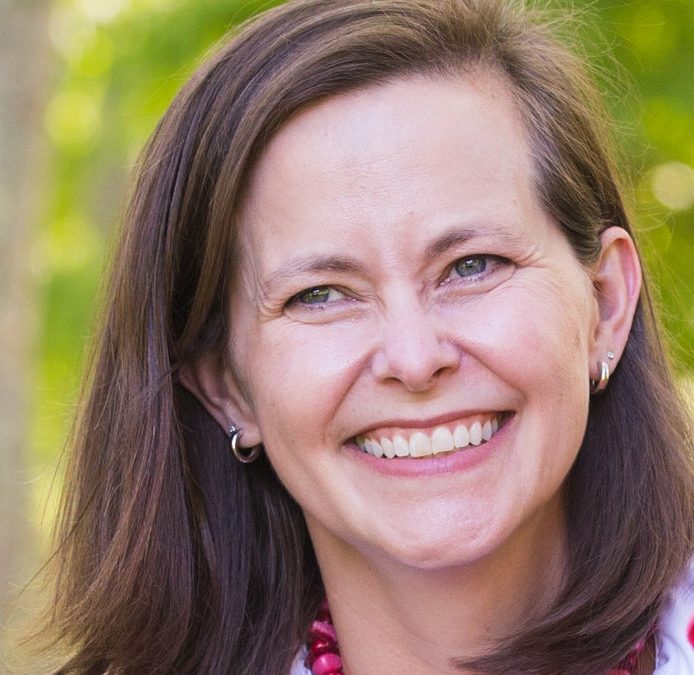
Meet Angela Dills
To continue with our highlights of our 2020-21 Faculty Affiliates, today we are putting Dr. Angela Dills in the spotlight. Angela is the Gimelstob-Landry Distinguished Professor of Regional Economic Development and Professor of Economics at WCU.
Angela received a B.A. from the University of Virginia and an M.A. and Ph.D. in Economics from Boston University. Before joining WCU as a professor, she held faculty positions at Clemson University, Mercer University, Wellesley College and Providence College. Currently, Angela’s research focuses on policy questions in both education and health.
For her research with CSFE, Angela is focusing on telemedicine and the recently passed parity laws that allow people a different way to access healthcare. Mainly, this research zeroes in on the concern that the quality of care is not as good via telemedicine.
Telemedicine includes not only video conferencing with your provider but also interactions such as sending photos of concerning issues to your provider, your provider sending medical images to a specialist or the use of asynchronous electronic transfer technology used to provide constant monitoring to patients with heart conditions or diabetes.
Since the beginning of the COVID-19 pandemic, telemedicine has been utilized far more to prevent furthering the spread of the virus. Thus, many states and the federal government have adopted pandemic-specific rules that allow more patients to use their insurance to cover telemedicine access to their providers.
“But not only are more people using telemedicine because of the pandemic but a lot of states and Medicare and Medicaid programs have relaxed their rules on telemedicine and made it a lot easier for people to use telemedicine and have their insurance cover the telemedicine and we’ve seen telemedicine explode,” said Angela.
With no real end date to the pandemic set in stone, the question becomes if these relaxed laws will stay in place. Through Angela’s research, she has found that there really is no lapse in the quality of care that patients receive, providers can cut down costs using these methods and people have more access to healthcare and specialists. These results argue for keeping the pandemic-rules in place, even after the pandemic.
“Telemedicine holds a lot of promise for Western North Carolina and in general areas in the US that look like Western North Carolina. We are medically underserved, particularly in the very western counties and telemedicine provides opportunities for people who might have to drive two hours each way to get to Asheville to see a specialist or to get to another larger metropolitan area to see a specialist. Telemedicine provides opportunities for patients to more easily and more affordably access care, making rural areas more livable.” said Angela.
We are very proud to have Angela in our 2020-21 Faculty Affiliate cohort and for her hard work and research. Her issue brief on telemedicine will be available in March. On the horizon, Angela is working with Audrey Redford and another co-author on a paper about death by distribution laws.
Thanks to Angela for making her work a part of CSFE.
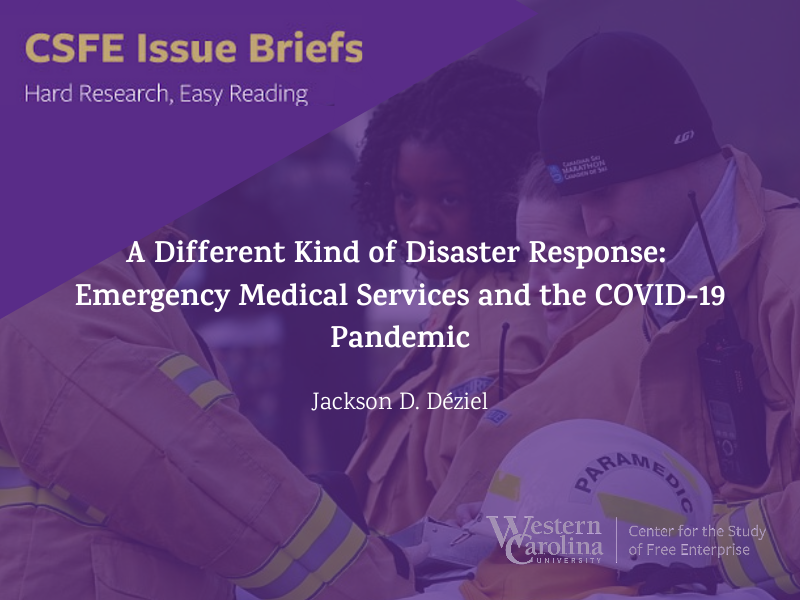
CSFE’s new study on Paramedics and the Pandemic
EMT’s and paramedics have taken on profoundly new and different roles since the pandemic. Unlike singular and localized events, COVID-19 presented new challenges to Emergency Medical Services professionals. In response, these EMS professionals have upgraded their preparation, and new pressures are mounting to evolve professional training and public policy as well. These insights and more are part of our newest study by Faculty Affiliate Jackson Déziel, “A Different Kind of Disaster Response: Emergency Medical Services and the COVID-19 Pandemic.” Professor Déziel is Director of WCU’s Emergency Medical Care program, and his research background is in the field of public policy. We can’t think of a better source for understanding the intersection of emergency services and public policy. His work provides workable ideas for bolstering the EMS workforce, expanding occupational roles, and promoting innovation by emergency professionals throughout the industry. Read the full study at the link above, and feel free to visit another entry on this blog, Meet Jackson Déziel.

